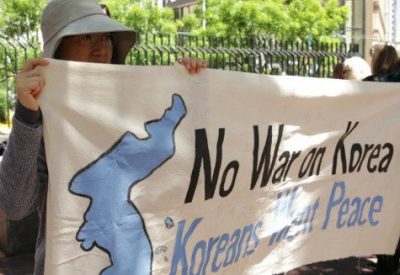A Korean Peninsula Crisis Resolution Proposal

VISIT MY NEW WEB SITE:
Contact at [email protected].
The Syrian peace process could be a model for Russia and China to pursue in trying to defuse crisis on the Korean peninsula – Washington not involved except as an observer.
Important progress has been made despite no decisive breakthroughs – Russia leading the effort, largely circumventing Washington, Iran and Turkey the other key players, agreement on multiple de-escalation zones important steps toward hoped for conflict resolution one day.
Years of failed efforts led to where things stand now, the process greatly aided by Syrian and allied military successes on the ground, greatly aided by Russian airpower.
Syria is a US-instigated war zone. The objective on the Korean peninsula is preventing preventing its outbreak, risking a potentially catastrophic nuclear confrontation – what China and Russia most of all want avoided.
They want diplomatic engagement with North Korea. Washington rejects the idea, wanting longstanding hostility toward the DPRK maintained – little likelihood of getting Trump administration hawks to change their position.
The only near-term option is proceeding without Washington’s involvement, Russia and China spearheading the diplomatic effort, getting the UN involved, aiming to persuade South Korea and Japan to join their initiative.
The objective is peace and stability on the Korean peninsula. If the Astana/Geneva process was able to achieve incremental progress over many months on Syria, why can’t something similar work in northeast Asia.
Admittedly it’s a gamble without US involvement. If the UN, South Korea and Japan ally with Russia and China to avoid war on the Korean peninsula, something they all want, maybe progress can be made toward defusing crisis conditions.
If America is left out initially, maybe it’ll decide to get involved later on, especially if a more willing administration succeeds Trump. Here’s where things stand now.
Sanctions, saber rattling and threats are counterproductive, encouraging Pyongyang to go all-out to develop its nuclear and ballistic missile capabilities.
The Trump administration wants regional tensions stoked, not defused, a pretext for its provocative regional military presence – manufacturing a nonexistent North Korean threat.
The DPRK wants peace, not war. So do Russia, China, South Korea, Japan and the rest of the world community except America and perhaps a few of its rogue allies.
At this stage, it’s pointless to pressure the Trump administration to engage with North Korea diplomatically.
A Sino/Russian peace initiative appears the only option worth pursuing, its success dependent on getting UN, South Korean and Japanese involvement, no easy objective to achieve – given Washington’s control over these countries and the world body.
Nothing ventured, nothing gained. Everything tried so far failed. Russia’s UN envoy Vasily Nebenzya said a new approach is needed.
Russian upper house Federation Council First Deputy Chairman Frants Klintsevich said
“I don’t think that Trump is capable of getting over himself even to achieve the most important task, which is to ensure global security. Besides, such step could be viewed as a weakness in the US.”
Though America is too important to ignore, circumventing it diplomatically to avoid war on the Korean peninsula is worth trying.
Washington justifies its unjustifiable belligerence by cobbling together so-called coalition partners.
South Korea and Japan are in harm’s way if war erupts on the Korean peninsula. Sergey Lavrov and his team are highly skilled diplomats.
Russia and China are dedicated to regional peace. So is Pyongyang. South Korea and Japan want war avoided.
Establishing a regional conflict resolution coalition may be the only way to try preventing unthinkable war on the Korean peninsula.
Involvement of the relevant regional countries along with the UN would give US hawks pause about initiating war – even while Pyongyang continues developing its nuclear and ballistic capabilities as deterrents against feared US aggression.
VISIT MY NEW WEB SITE: stephenlendman.org (Home – Stephen Lendman). Contact at [email protected].
My newest book as editor and contributor is titled “Flashpoint in Ukraine: How the US Drive for Hegemony Risks WW III.”
http://www.claritypress.com/LendmanIII.html
Listen to cutting-edge discussions with distinguished guests on the Progressive Radio News Hour on the Progressive Radio Network.
Featured image is from Socialist Project.

